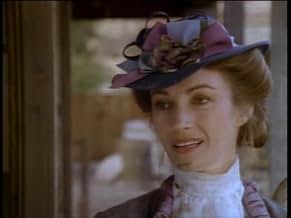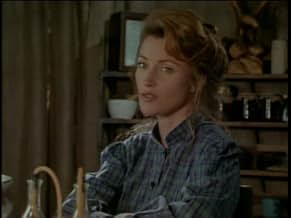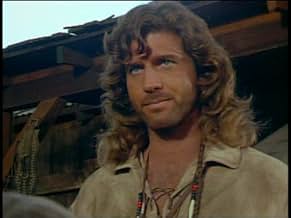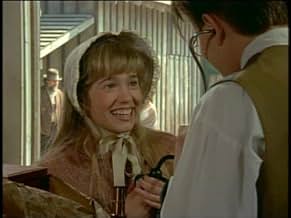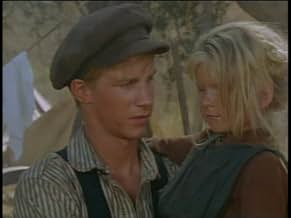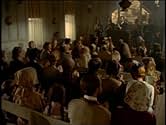अपनी भाषा में प्लॉट जोड़ेंThe trials and adventures of a female doctor in a small Wild West town.The trials and adventures of a female doctor in a small Wild West town.The trials and adventures of a female doctor in a small Wild West town.
- 4 प्राइमटाइम एमी जीते
- 20 जीत और कुल 45 नामांकन
एपिसोड ब्राउज़ करें
फ़ीचर्ड समीक्षाएं
I am really taken aback that the only comment I see so far for this excellent show is entirely negative and dismissive. I feel compelled to set the record straight. The commentator dismisses the show for, among other things, anachronistic historical inaccuracy, as well as politically correct emotional sterility.
That is ridiculous. This was a wonderful show. The episodes were certainly not all the same. It dealt with many issues that are politically and socially relevant. It presented emotionally gripping drama, with different points of view, especially including compassionate consideration of the plight of native American people. It reminded me very much of the show Kung Fu, which is set during the same period in American history, the 1870s, and also had similar themes of pacifism, labor militancy, feminism, the plight of native Americans as well as the Chinese immigrants. (In actuality, David Carradine himself, a good friend of the Director and Seymour's husband, James Keatch (brother to Stacy Keatch, who appeared in one episode as President Ulysses Grant), appears in one of the episodes. The Keatches and the Carradines go back at least to the time when both families did the movie on the Younger-James gang.)
This show won an AWARD from the Smithosonian institution, hardly a left-wing bastion of political correctness, for its portrayal of the massacre of the Cheyenne at Washita. Its portrayal of the history of the persecution and genocide of the native Americans, by such notorious b******s as Chivington and Custer, was meticulously researched. Its show on Walt Whitman is a case in point as a study of actual attitudes, scientific as well as popular, toward homosexuality, during this period.
The show presented well the CENTRAL cultural conflict in American history, as portrayed by such authors as Leslie Fiedling (LOVE AND DEATH IN THE AMERICAN NOVEL) and Richard Slotkin (RESURRECTION THROUGH VIOLENCE): between the murderous drive to conquer nature and exterminate the "Reds," vs. those, like Dr. Quinn, Sully, and their family, who seek, then as now, to make peace with their fellow human beings and the natural environment.
The show emphasized the value of an emotionally, politically, and socially complex community, with its racial and ethnic hierarchies which Doctor Quinn continually challenged, and its emotional intimacies among men and women. Absolutely historically accurate!
Last but certainly not least, the romantic aspects of the show: the growing romance between Dr. Quinn and Byron Sully, her adopted son Matthew and first Ingrid, and then the prostitute (what was her name?), and between her daughter. Caroline, and the Doctor, Andrew, were great: as was the portrayal of Matthew's coming of age as first the non-violent sheriff of the town, and then as a budding attorney.
Please, if you have never seen this show before, do not be dissuaded by the previous commentator. Check it out-you'll be doing yourself a big favor. This is one of the best shows ever made for television!
That is ridiculous. This was a wonderful show. The episodes were certainly not all the same. It dealt with many issues that are politically and socially relevant. It presented emotionally gripping drama, with different points of view, especially including compassionate consideration of the plight of native American people. It reminded me very much of the show Kung Fu, which is set during the same period in American history, the 1870s, and also had similar themes of pacifism, labor militancy, feminism, the plight of native Americans as well as the Chinese immigrants. (In actuality, David Carradine himself, a good friend of the Director and Seymour's husband, James Keatch (brother to Stacy Keatch, who appeared in one episode as President Ulysses Grant), appears in one of the episodes. The Keatches and the Carradines go back at least to the time when both families did the movie on the Younger-James gang.)
This show won an AWARD from the Smithosonian institution, hardly a left-wing bastion of political correctness, for its portrayal of the massacre of the Cheyenne at Washita. Its portrayal of the history of the persecution and genocide of the native Americans, by such notorious b******s as Chivington and Custer, was meticulously researched. Its show on Walt Whitman is a case in point as a study of actual attitudes, scientific as well as popular, toward homosexuality, during this period.
The show presented well the CENTRAL cultural conflict in American history, as portrayed by such authors as Leslie Fiedling (LOVE AND DEATH IN THE AMERICAN NOVEL) and Richard Slotkin (RESURRECTION THROUGH VIOLENCE): between the murderous drive to conquer nature and exterminate the "Reds," vs. those, like Dr. Quinn, Sully, and their family, who seek, then as now, to make peace with their fellow human beings and the natural environment.
The show emphasized the value of an emotionally, politically, and socially complex community, with its racial and ethnic hierarchies which Doctor Quinn continually challenged, and its emotional intimacies among men and women. Absolutely historically accurate!
Last but certainly not least, the romantic aspects of the show: the growing romance between Dr. Quinn and Byron Sully, her adopted son Matthew and first Ingrid, and then the prostitute (what was her name?), and between her daughter. Caroline, and the Doctor, Andrew, were great: as was the portrayal of Matthew's coming of age as first the non-violent sheriff of the town, and then as a budding attorney.
Please, if you have never seen this show before, do not be dissuaded by the previous commentator. Check it out-you'll be doing yourself a big favor. This is one of the best shows ever made for television!
While I was not a faithful devotee of the series, I tuned in whenever the opportunity presented itself and invariably enjoyed the stories revolving around a frontier town's lady doctor. I view the program strictly as entertainment, and missed too many episodes to comment accurately on any social issues depicted or historical liberties taken. However, I will note that the show does justifiably denounce racism and tends to cast native people in a sympathetic light.
Set just after the Civil War, the series portrays the ongoing story of a lovely young Boston doctor, Michaela Quinn, who following the death of her own physician father, moves to the frontier town of Colorado Springs. There Dr. Mike sets up her medical practice, to the consternation of those upset at the novel prospect of a female physician. Byron Sully, a rugged mountain man (and friend to the Cheyanne) helps her adjust to frontier life, and naturally the pair develop a mutual attraction. She is aided by a midwife, Charlotte Cooper, who on her deathbed following a snake bike, places her three children (Colleen, Brian, and the older Matthew) in Dr. Mike's care. Thus the doctor takes upon herself the responsibility of three adopted children. Later Dr. Mike marries Sully and they have a baby of their own, little Katie, to add to their previously existing foster family.
The beautiful British actress, Jane Seymour, is radiant, appealing, and sympathetic as the frontier doctor. Dr. Quinn certainly displays an admirable strength of wit and character, tackling both a challenging career and an instant family in this rugged pioneer setting. Yet she also reveals a touching vulnerability. The chemistry is electric between her and Sully (charismatically played by actor Joe Lando) and that factor is probably responsible for much of the show's success. On the whole, it's an engaging series and when it first aired, proved from my perspective superior to much of that era's TV programming.
Set just after the Civil War, the series portrays the ongoing story of a lovely young Boston doctor, Michaela Quinn, who following the death of her own physician father, moves to the frontier town of Colorado Springs. There Dr. Mike sets up her medical practice, to the consternation of those upset at the novel prospect of a female physician. Byron Sully, a rugged mountain man (and friend to the Cheyanne) helps her adjust to frontier life, and naturally the pair develop a mutual attraction. She is aided by a midwife, Charlotte Cooper, who on her deathbed following a snake bike, places her three children (Colleen, Brian, and the older Matthew) in Dr. Mike's care. Thus the doctor takes upon herself the responsibility of three adopted children. Later Dr. Mike marries Sully and they have a baby of their own, little Katie, to add to their previously existing foster family.
The beautiful British actress, Jane Seymour, is radiant, appealing, and sympathetic as the frontier doctor. Dr. Quinn certainly displays an admirable strength of wit and character, tackling both a challenging career and an instant family in this rugged pioneer setting. Yet she also reveals a touching vulnerability. The chemistry is electric between her and Sully (charismatically played by actor Joe Lando) and that factor is probably responsible for much of the show's success. On the whole, it's an engaging series and when it first aired, proved from my perspective superior to much of that era's TV programming.
I dearly love this show. I was so sorry to see it cancelled. I watched it every week and in reruns. Some of my favorite episodes had Johnny Cash and his wife June and a couple of episodes with Willie Nelson.
I was watching it on Hallmark when they suddenly took it off. Now I can't find it on any channel. Good news though. They have now put Dr. Quinn on DVD. I have bought the first season and am waiting for the second season to come out the end of this month. Now I can watch them any time I want and don't have to depend on tv to put them on just whenever they want to.
I was watching it on Hallmark when they suddenly took it off. Now I can't find it on any channel. Good news though. They have now put Dr. Quinn on DVD. I have bought the first season and am waiting for the second season to come out the end of this month. Now I can watch them any time I want and don't have to depend on tv to put them on just whenever they want to.
People need to relax their standards a bit. No one in their right mind expects fiction to be historically accurate at all times.
However, it must be said that, more often than not, the time line was appropriate for many of the events portrayed.
A reviewer mentioned that the pacifist ideals of Dr. Mike were highly unusual for the time. Indeed. That is why, perhaps, she (and Sully) are often the only ones who held those pacifist views, where as most of the townsfolk in the show wanted to have a hanging every chance they got. There were peace-loving people back then. Had there not been, every single Native American would be wiped out, slavery would have continued undeterred, and women would have been denied the right to vote... to name only a few examples.
As for women not going to college back then? Nonsense. It was not as common then as it is today, obviously, but it did occur. Please, do a google search on "Medical College of Pennsylvania, Woman's Medical College of Pennsylvania", which opened in 1850 and was the first female medical college in the world. It does not require a huge stretch of the imagination to suppose that a graduate from such a school would have been progressive, and might have found herself practicing medicine on the American frontier.
As for the show, I love it. I found the Season 4 DVDs in my local book store, and now have seasons 1-3. I watched the show when it was brand new in the early 90's, but stopped at season 2 because my husband and I got stationed in Asia and it was unavailable there. It's been a pleasure becoming reacquainted with Dr. Mike, Sully, and all of the people of Colorado Springs.
We normally don't watch TV, as there is nothing on worth watching. It is so refreshing to be able to watch good television with my kids. I recommend this show whole-heartedly.
However, it must be said that, more often than not, the time line was appropriate for many of the events portrayed.
A reviewer mentioned that the pacifist ideals of Dr. Mike were highly unusual for the time. Indeed. That is why, perhaps, she (and Sully) are often the only ones who held those pacifist views, where as most of the townsfolk in the show wanted to have a hanging every chance they got. There were peace-loving people back then. Had there not been, every single Native American would be wiped out, slavery would have continued undeterred, and women would have been denied the right to vote... to name only a few examples.
As for women not going to college back then? Nonsense. It was not as common then as it is today, obviously, but it did occur. Please, do a google search on "Medical College of Pennsylvania, Woman's Medical College of Pennsylvania", which opened in 1850 and was the first female medical college in the world. It does not require a huge stretch of the imagination to suppose that a graduate from such a school would have been progressive, and might have found herself practicing medicine on the American frontier.
As for the show, I love it. I found the Season 4 DVDs in my local book store, and now have seasons 1-3. I watched the show when it was brand new in the early 90's, but stopped at season 2 because my husband and I got stationed in Asia and it was unavailable there. It's been a pleasure becoming reacquainted with Dr. Mike, Sully, and all of the people of Colorado Springs.
We normally don't watch TV, as there is nothing on worth watching. It is so refreshing to be able to watch good television with my kids. I recommend this show whole-heartedly.
It is a sad day when programs produced for general family viewing are so few and far between. However, it is comforting to know that Dr. Quinn, Medicine Woman joins the ranks of great family programming. One of my favorite episodes is 'Just One Lullaby', which depicts the thin line between school discipline and abuse. I did not agree with the way in which the teacher 'got a taste of her own medicine' toward the end of the episode, but it proved the adage that 'what goes around, comes around'.
Dr. Quinn, Medicine Woman may just go down in history as a great television classic.
Huzzah for this one.
Dr. Quinn, Medicine Woman may just go down in history as a great television classic.
Huzzah for this one.
क्या आपको पता है
- ट्रिवियाIn a 2015 feature on National Public Radio, Jane Seymour said that although she eventually came to think of "Dr. Quinn" as one of the projects she is most proud of in her career, she originally signed her contract for it (including both the TV-movie/pilot and a five-year series commitment) with only one night's notice--not because she had any particular interest in the show but because she had just discovered that her then husband/business manager had lost all her money and gotten her $9 million in debt. She had told her agent that to avoid losing her house and to protect her two young children, she would do any TV project available no matter what it was, and Dr. Quinn was the first one offered to her.
- गूफ़Mr. Bray's store doors change from having windows to solid wood and back to having windows.
- भाव
Byron Sully: Someone's wife is pretty mad.
Dr. Michaela 'Mike' Quinn: My goodness, she's angry. I feel sorry for the poor fellow. Whose teepee is it?
Cloud Dancing: Mine.
- कनेक्शनFeatured in The 45th Annual Primetime Emmy Awards (1993)
टॉप पसंद
रेटिंग देने के लिए साइन-इन करें और वैयक्तिकृत सुझावों के लिए वॉचलिस्ट करें
- How many seasons does Dr. Quinn, Medicine Woman have?Alexa द्वारा संचालित
- Interesting pilot faq
विवरण
इस पेज में योगदान दें
किसी बदलाव का सुझाव दें या अनुपलब्ध कॉन्टेंट जोड़ें

टॉप गैप
By what name was Dr. Quinn, Medicine Woman (1993) officially released in India in English?
जवाब






